|
|
|
Sort Order |
|
|
|
Items / Page
|
|
|
|
|
|
|
| Srl | Item |
| 1 |
ID:
186872
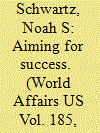

|
|
|
|
|
| Summary/Abstract |
Despite the popularity of the Evidence-Based Policy Making paradigm, scholarly evidence often fails to have an impact in emotional or value-laden policy debates. Consequently, changes to Canada’s gun control laws in recent years have often failed to incorporate scholarly research. This is problematic given that the forces of path dependence impose costs on policy makers who seek to reverse established policies, even if they are dysfunctional. This article lays the theoretical foundations for a Firearms Policy Evaluation Framework, which can be used by scholars, policy makers, advocates, and the public to conduct preliminary evaluations of proposed firearms policies before they become law. The utility of the framework is then demonstrated with an evaluation of the 2020 assault-style weapons ban in Canada, which includes a systematic scoping review of the literature on the impact of assault-weapons bans.
|
|
|
|
|
|
|
|
|
|
|
|
|
|
|
|
| 2 |
ID:
186877
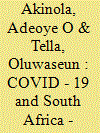

|
|
|
|
|
| Summary/Abstract |
While South Africa–China relations were only formalized in 1998, relations between these states date back to the 1800s. South Africa's quest for sustainable development through partnerships with global powers motivated its close ties with China. The 2015 Cape Town Declaration committed the two countries to improve health facilities and disease control. The coronavirus (COVID-19) pandemic presents an opportunity to rethink this partnership. Drawing on desktop research, this article engages the reality of COVID-19 and explores South Africa–China relations in the context of the pandemic. The emergence of the virus in China, its rapid spread, and the high fatality rate have had devastating repercussions across the world. This article argues that Beijing's response to COVID-19 raises more questions than it answers. The outbreak of the virus in China, its response, and emerging cases of racism and xenophobia against Africans in China also raise concerns about the future of South Africa–China relations.
|
|
|
|
|
|
|
|
|
|
|
|
|
|
|
|
| 3 |
ID:
186876
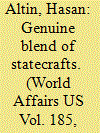

|
|
|
|
|
| Summary/Abstract |
Power transition in the international order and the position of China in this order have triggered ramifications in China's foreign policy strategy toward the Middle East and North Africa (MENA) region. Its foreign policy approach has evolved from strict non-intervention to an assertive policy at the international level and constructive engagement at the regional level. China has simultaneously been applying both soft and hard power to protect its national interests in MENA. This study aims to assess China's four-pillar MENA policy from the perspective of its smart power strategy by examining its hard power means and soft power tools.
|
|
|
|
|
|
|
|
|
|
|
|
|
|
|
|
| 4 |
ID:
186871
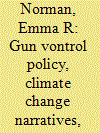

|
|
|
|
|
| Summary/Abstract |
At the time of writing this Editor's Note, it has been but a few weeks since the horrifying school shooting in Uvalde, Texas on May 24, 2022, that killed 19 children and two teachers, and the supermarket massacre of ten people in Buffalo, New York ten days earlier. Both lone gunmen were 18 years old and both used legally acquired AR-15-style weapons (Edmondson 2022). The events catapulted gun control debates again into the headlines and culminated in swift legislation proposals in Congress. On June 8, 2022, a bitterly divided House—voting largely along party lines—approved a stricter gun control bill package by 223 to 204 votes but also revealed the partisan chasm that continues to afflict passing effective firearms control legislation in the United States. Among other things, the bill would ban under-21s from legally purchasing semiautomatic rifles, increase requirements for gun storage in private households, and prohibit the sale of magazines holding over 15 rounds (Edmondson 2022). The acrimonious arguments in the House were predictably partisan with Democrats focusing on protecting children from gun violence while Republicans highlighted that the proposal would violate Second Amendment rights. Representative Jim Jordan (R-OH; cited in Edmondson 2022), opined that protecting children “is important—it sure is. But this bill doesn't do it. What this bill does is take away Second Amendment rights, God-given rights, protected by our Constitution, from law-abiding American citizens.”
|
|
|
|
|
|
|
|
|
|
|
|
|
|
|
|
| 5 |
ID:
186873


|
|
|
|
|
| Summary/Abstract |
Understanding the reasoning behind diverse views grows empathy and can help strengthen democracy. This study examines narratives and their influence on individuals, to see if individuals only empathize with narratives from those with whom they share identity. Using an experimental design, we test empathy with working class climate change narratives. Results showed participants who agreed with anthropogenic climate change, who were given both evidence and a narrative, empathized with the narrator (either an organic farmer or a mechanic) that told a pro-climate change narrative. The greatest empathy was for the mechanic telling a pro-climate change narrative. Conversely, participants who did not agree with human-caused climate change and who were given evidence without narrative had more empathy for the organic farmer (over the mechanic) who told a pro-climate change narrative. Overall, we found some identity issues negatively influenced empathy, but we also found examples where individuals moved beyond their identity.
|
|
|
|
|
|
|
|
|
|
|
|
|
|
|
|
| 6 |
ID:
186875
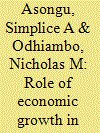

|
|
|
|
|
| Summary/Abstract |
This study establishes economic growth needed for supply-side mobile money drivers in developing countries to be positively related to mobile money innovations in the perspectives of mobile money accounts, the mobile phone used to send money, and the mobile phone used to receive money. The empirical evidence is based on Tobit regressions. For the negative net relationships that are computed, minimum economic growth thresholds are established above which the net negative relationships become net positive relationships. The following minimum economic growth rates are required for nexuses between supply-side mobile money drivers and mobile money innovations to be positive: (i) 6.109 percent (6.193%) of Gross Domestic Product (GDP) growth for mobile connectivity performance to be positively associated with the mobile phone used to send (receive) money and (ii) 4.590 percent (4.259%) of GDP growth for mobile connectivity coverage to be positively associated with the mobile phone used to send (receive) money.
|
|
|
|
|
|
|
|
|
|
|
|
|
|
|
|
| 7 |
ID:
186874


|
|
|
|
|
| Summary/Abstract |
This article examines the legal contours of the international law regime as it relates to internally displaced people (IDPs) and assesses it critically. It analyzes the structural legal and humanitarian injustices from which IDPs suffer as a result of often arbitrary distinctions between them and refugees in international refugee law, international human rights law, and international humanitarian law. It explores how IDPs do not have the same explicit, dedicated legal protections in international law as refugees who have fled their countries of origin and crossed an international border. It argues that precisely because IDPs lack international legal protections, their rights and needs are often overlooked and met with indifference and lack of sufficient humanitarian response from the United Nations, its agencies and member states, and global humanitarian NGOs. It discusses efforts to recognize a specific set of international legal rights for IDPs, why they have been stymied for several decades, and the practical consequences in terms of human rights deferred and denied and human welfare undermined for IDPs and their increasing vulnerability and disadvantage. Finally, it presents ways of improving respect for and fulfillment of the human rights of IDPs.
|
|
|
|
|
|
|
|
|
|
|
|
|
|
|
|
|
|
|
|
|